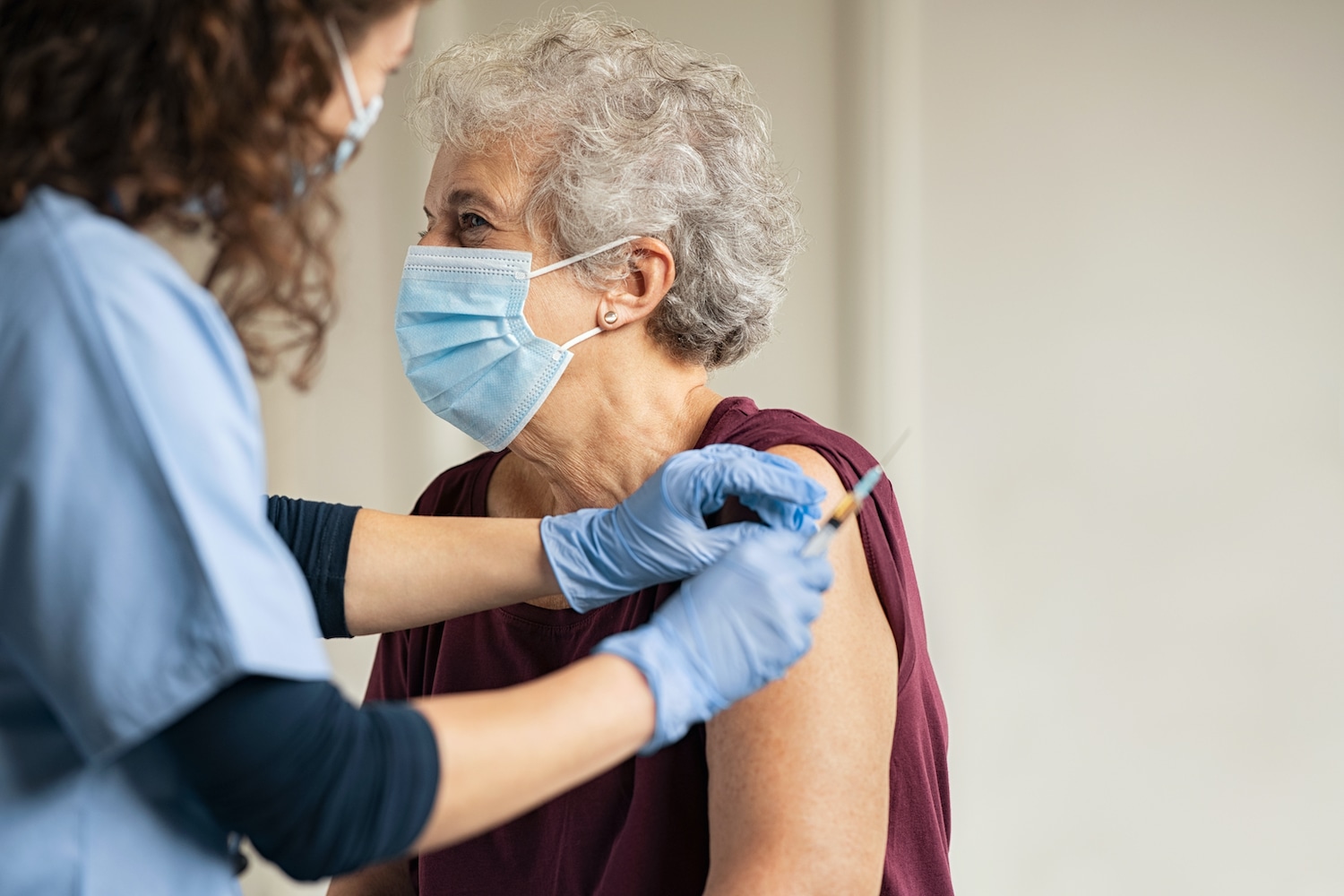People with cancer are more likely than people without cancer to suffer complications from infection with SARS-CoV-2, the virus that causes COVID-19. While cancer patients are generally recommended to receive COVID-19 vaccines, questions remain about just how effective the vaccines are for them, particularly patients who are severely immunocompromised. The latest research into the question indicates that while the COVID-19 vaccines probably do confer protection against the virus for many people with cancer, the extent of the protection likely depends on various factors, including type of cancer and cancer treatment.
A study of 102 adult patients with solid tumors undergoing treatment at the Rabin Medical Center in Petah Tikva, Israel, published May 28 in JAMA Oncology, found that 90% of the patients showed an antibody response to vaccination, compared to 100% of 78 healthy family members and caregivers whose responses were also analyzed. Both the cancer patients and the caregivers had received the second dose of the Pfizer-BioNTech COVID-19 vaccine at least 12 days prior to antibody testing. The researchers tested for immunoglobulin G (IgG) antibodies against a piece of the virus—the spike protein—that the vaccines train the immune system to recognize. These antibodies can help protect against infection.
For More Information
Read more coverage here from Cancer Today on the various impacts of the coronavirus on people with cancer.
However, while many of the cancer patients did produce antibodies in response to the vaccine, their median antibody levels were lower compared to the levels found in the people without cancer. The patients in the study were all currently receiving treatment with infused drugs like chemotherapies or immune checkpoint inhibitors. The only factor significantly associated with lower levels of antibodies was undergoing a combined chemotherapy and immunotherapy regimen. Oncologists are particularly worried about immunosuppressive cancer treatments like chemotherapy interfering with vaccine response, says Mounzer Agha, the director of the Mario Lemieux Center for Blood Cancers at the UPMC Hillman Cancer Center in Pittsburgh.
People with blood cancers like chronic lymphocytic leukemia (CLL)—a cancer of white blood cells known as B cells—appear less likely to have an antibody response to the COVID-19 vaccine than patients with solid tumors. Blood cancer patients are more likely to receive more intensive chemotherapy than other cancer patients, and they also may receive therapies that affect the bone marrow like stem cell transplants, says Ravi Parikh, an oncologist at the Corporal Michael J. Crescenz VA Medical Center in Philadelphia. Additionally, some blood cancers and blood cancer treatments affect immune cells like B cells that are necessary for antibody production.
In a study published April 16 in Blood, of 167 patients with CLL who received two doses of the Pfizer-BioNTech vaccine, only 39.5% had an antibody response; the patients most likely to respond were in remission and not currently in treatment. Moreover, in a preprint co-authored by Agha, which has yet to be peer reviewed and published, 46% of patients with a variety of blood cancers did not respond to the Pfizer-BioNTech or Moderna vaccines. The researchers found that patients with CLL were especially unlikely to respond—only 23% produced antibodies even though 70% were not actively being treated for cancer. In another preprint, 117 out of 139, or 84%, of multiple myeloma patients vaccinated with the Pfizer-BioNTech or Moderna vaccines developed an antibody response. When compared to age-matched controls, multiple myeloma patients were more likely to have lower antibody responses or no antibody responses at all, especially if actively receiving treatment for their cancer.
It’s important to note that antibody levels are an imperfect measure of protection against SARS-CoV-2, says Parikh. There has not yet been enough research to determine what level of antibodies people need in order to be protected against SARS-CoV-2. Even if cancer patients have lower levels of antibodies, “they may still be protected,” he says.
In addition to antibodies, another key component of protection against SARS-CoV-2 is cellular immunity, says Salomon Stemmer, the senior author of the Israeli study and an oncologist at the Rabin Medical Center. This involves immune cells like T cells, which can both help rally the immune system to fight infections and directly kill infected cells. Cellular immunity can be disrupted in the setting of cancer, which makes interpreting antibody levels in cancer patients more difficult. For instance, it is possible that a cancer patient has adequate levels of IgG antibodies after vaccination but may still be susceptible to contracting COVID-19 due to problems with other components of the immune system. This is why it’s important for patients to continue to be “very vigilant about social isolation and continue to be around family members and friends who have been vaccinated,” says Agha.
This doesn’t mean that cancer patients should avoid vaccination. To the contrary, experts agree that the potential benefits of the vaccine are significant, despite some of the uncertainties about the extent of its effectiveness in some cancer patients, especially because COVID-19 poses a higher health risk to people with cancer than to others. “I think any patient with cancer should be vaccinated,” says Parikh.
Experts are investigating whether it will be worthwhile for patients to receive an additional dose of the vaccine called a booster shot to improve their protection against SARS-CoV-2. Agha says that there have been cases of patients developing antibodies after a third shot who had previously not developed antibodies but cautions that there is no conclusive evidence to recommend this to patients as of yet.
In the meantime, experts urge cancer patients to get vaccinated but continue to take precautions to protect themselves against the virus. “Don’t assume that getting the vaccine guarantees that you are going to be protected,” says Agha. “Try to be very careful and ask family and friends to also get vaccinated.”
Cancer Today magazine is free to cancer patients, survivors and caregivers who live in the U.S. Subscribe here to receive four issues per year.





